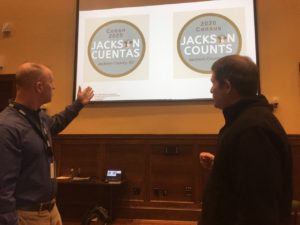This story was originally published in the Sylva Herald on March 4, 2020.
The 2020 Census could mean more government funds and representation for North Carolina. Census Partnership Specialist Charles Megown spoke on behalf of the United States Census at the Jackson County Public Library on Thursday, Feb. 27, to try and promote the importance of the upcoming census for the area.

Chuck Megown, left, and Micheal Poston, right, speak after library meeting on Feb. 27.
Every 10 years, the United States takes a census to determine, among other things, how many of the 435 available seats each state will get in The House of Representatives. This results in the redistricting of state’s congressional voting districts. Along with the additional political representation, the federal government uses the information gathered during the census to determine how $675 billion a year will be dispersed throughout the country. The census will set the course for how states spend federal funds over the next 10 years.
States can gain
North Carolina is in the position to gain a representative, which could mean extra clout for the state in Congress. And additional population would mean the allocation of additional federal dollars. “It’s a lot of money for us locally, and a lot of the dollars are spent locally,” Jackson County Planning Director Michael Poston said.
Each person counted represents about $1,600 in federal aid, which makes the process of accurately counting the population critical.
Arriving soon
On March 12, Jackson County residents should start checking their mail for forms to self-respond to the census, which can help lessen the burden on local census takers. Otherwise, someone from the Census Bureau will be going door to door to take the census of those who do not self-respond. The agents going door to door will have a special badge, iPad and bag. They also will never ask for money or a Social Security Number.
Ensuring that every citizen gets counted once and only once is the ultimate goal of the Census, Megown said. But, that can be a difficult task in itself. The populations that are most likely to be undercounted are children under 5 years of age, people with disabilities, the homeless, people living in remote rural areas, low-income households, migrant workers, immigrants, people with limited English skills and renters, Megown said.
Many of those categories, if not all, are present within Jackson County, which can make this area challenging to ensure that all its citizens are counted. The people most likely to not be counted are the ones who would benefit the most from additional federal aid, Poston said.
Education a key
According to Megown, the area within Jackson County most at risk of being undercounted is Western Carolina University. The Census Bureau estimates that 27 percent will not self-respond. Another issue that arises from students living in Jackson County for school and then returning home for the summer is the risk of double counting. Since WCU students live in Jackson county nine months out of the year, they need to be counted in Jackson County, not their hometown, Megown said.
“The key for us is education,” Poston said when asked what the best course of action is for those at risk of being miscounted. “If they respond, we have a better chance of helping them.”
Along with educating citizens about the Census, teaming up government with local organizations is another way that they are trying to shrink the gap of the undercounted, Poston said. He explained that working with different organizations around the area will make it easier to reach out to some of the groups that tend to fall through the cracks. Poston mentioned working with the local chapter of the NAACP, homeless outreach centers and Lane Perry from WCU’s Center for Community Engagement and Service Learning. “We’re throwing the nets far and wide, trying to catch as many people as possible,” Poston said.
Jobs available
The Census wants to hire 2020 Census takers. Megown says they want locals because “people are less likely to shut the door on their neighbor.” They are also looking for Spanish speakers to make it easier to count the Spanish-speaking population.
As of Feb. 27, the census has received 410 applications, but they need 845 applicants for Jackson County. It pays $19 an hour to be a Census taker, which Megown says has gone up since last year due to the need for more applicants. To apply, go to https://recruitment.2020census.gov/Census/Applicants
.


